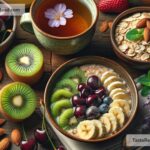Foods for Improving Sleep Quality: Eat Your Way to Better Rest
Getting a good night’s sleep is essential for feeling healthy and energetic. Poor sleep can make you feel tired, cranky, or even affect your overall health. While it’s important to avoid caffeine close to bedtime or create a calming bedtime routine, what you eat also plays a big role in improving sleep quality. Some foods can help relax your body and encourage a deep, restful sleep. Let’s dive into what you can eat to snooze better!
Why Sleep Matters
Before we talk about food, it’s important to understand why sleep is so crucial. When you sleep, your body repairs itself. Your brain processes memories, your muscles recover from daily activities, and your immune system gets stronger. If you don’t sleep well, you may struggle with focus, mood swings, or even physical health issues over time.
Improving your sleep doesn’t always mean taking drastic measures. Small dietary changes can make a big difference. Certain nutrients promote sleep by calming your mind, helping your muscles relax, or supporting your sleep cycle.
Foods That Help You Sleep Better
1. Bananas: Nature’s Sleep Snack
Bananas are a great bedtime snack. They contain magnesium and potassium, minerals that relax your muscles and can help reduce stress. They’re also rich in vitamin B6, which helps your body produce melatonin—a hormone that controls your sleep cycle. Eating a banana about an hour before bed might make falling asleep easier.
2. Cherries: Sweet and Sleepy
Cherries, especially tart cherries, are one of the few fruits that naturally contain melatonin. This hormone signals your body that it’s time to sleep. Drinking tart cherry juice or snacking on fresh cherries in the evening can improve sleep quality and duration.
3. Oats: A Warm Bowl of Calm
A bowl of oatmeal isn’t just for breakfast—it can also be a great evening snack. Oats contain melatonin and other sleep-friendly nutrients like magnesium and calcium. Just avoid adding too much sugar or caffeine-filled toppings; stick to healthy additions like cinnamon or bananas.
4. Almonds: A Crunchy Sleep Booster
Almonds are rich in magnesium, which helps your body relax and prepares you for sleep. They’re also a source of protein, which can stabilize your blood sugar during the night. Eating a small handful of almonds before bed can promote restful sleep.
5. Fatty Fish: For Deep Sleep
Fish like salmon, tuna, and mackerel are packed with omega-3 fatty acids and vitamin D. These nutrients help your brain regulate serotonin, a chemical that balances mood and supports sleep. A small serving of fatty fish for dinner may set the stage for better sleep later that night.
6. Kiwi: A Tiny Sleep Superfood
Kiwis are surprisingly effective for improving sleep. They are loaded with antioxidants and serotonin, which help regulate your sleep cycle. Eating one or two kiwis about an hour before bed has been shown to improve both sleep quality and duration.
7. Herbal Tea: A Sip of Relaxation
Herbal teas like chamomile, valerian root, or lavender are known as natural sleep aids. These teas contain calming compounds that help relax your nervous system. The warm temperature of the tea is also soothing and can signal your body that it’s time to wind down. Avoid caffeinated teas in the evening, as they’ll interfere with sleep.
8. Milk: A Classic Sleep Aid
Drinking a glass of warm milk has been a popular bedtime remedy for years—and it’s backed by science. Milk contains tryptophan, an amino acid that helps produce serotonin and melatonin. Additionally, the calming warmth can be comforting and prepare your body for rest.
9. Walnuts: Snack Your Way to Sleep
Walnuts are another excellent nut for sleep. Like almonds, they contain magnesium, but they also have tryptophan and melatonin in small amounts. These nutrients work together to help your body relax and transition into sleep mode.
10. Leafy Greens: A Bedtime Salad
Spinach, kale, and other leafy greens are rich in calcium, which helps your body use tryptophan to produce melatonin. While a salad for dinner might not sound exciting, adding leafy greens to your meals can contribute to better sleep over time.
Foods to Avoid Before Bed
While the foods above can help you sleep better, some foods can disrupt your sleep entirely. Avoid these in the evening if you’re hoping for a peaceful night:
- Caffeine: Found in coffee, tea, chocolate, and energy drinks, caffeine keeps your brain alert. Try to avoid it at least 6 hours before bedtime.
- Spicy Foods: These can cause stomach discomfort or indigestion, making it hard to relax.
- Sugary Snacks: A sugar rush may increase energy levels, leaving you tossing and turning at night.
- Alcohol: While alcohol might initially make you drowsy, it disrupts deep sleep and can wake you up during the night.
Tips for Better Sleep
In addition to eating sleep-promoting foods, here are a few quick tips to improve your nighttime routine:
– Stick to a consistent sleep schedule.
– Avoid screens (like phones or tablets) an hour before bed.
– Get regular exercise, but not too close to bedtime.
Final Thoughts
Good sleep is essential for a happy, healthy life—and what you eat plays a big role. Adding sleep-friendly foods to your diet can improve your rest and make bedtime more relaxing. Healthy snacks like bananas, almonds, or chamomile tea might be all you need to unwind and drift off peacefully.
So, listen to your body, eat well, and prioritize sleep. With the right foods, better rest is just a bite away!


